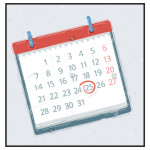The Ultimate Guide to End of Life Planning
By Emily Landau, Reader’s Digest Canada
Preparing for the end now can save your loved ones plenty of heartache—and money—later on. These practical tips will help get you started.
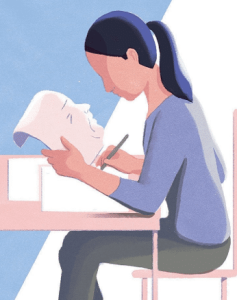
ILLUSTRATION: CORNELIA LI
Getting Your House in Order
Prepare a will
Death is one of those things many of us avoid thinking about until it’s absolutely necessary—it’s often too sad, too scary, too morbid. A 2018 Angus Reid survey showed that more than half of Canadian adults don’t have a signed will or personal directives. When asked why, many respondents said they thought they were too young. But you can save your family extra heartache by planning and budgeting for your end-of-life decisions early. Ian MacDonald, an independent funeral planner in Halifax, believes the purpose of a funeral is to help the living. “You’re helping them transition from life with someone they love to life without,” he says.
Form an advanced care plan
At the same time you’re moving forward in life—saving up for your first house or your kids’ education—you should be planning for the end of your life. Even in your 30s, it’s smart to have an advanced care plan, which outlines what you’ll tolerate in terms of medical care and life support, what should happen to your body, and how you want to be celebrated. An advanced care plan eliminates the guesswork involved in end-of-life decisions and, once someone’s gone, allows people to grieve instead of scrambling to make funeral decisions. “If you have life insurance,” MacDonald says, “you should probably have end-of-life planning.”
Save for your funeral
Like most milestone events, how much a funeral costs depends on how elaborate it is. Even a mid-range funeral can cost as much as a downpayment on a house—and many people don’t want to surprise their loved ones with the bill. Prices vary, but Brett Watson, president of the Funeral Services Association of Canada, estimates the average funeral-home package—including embalming, a casket, flowers, music and catering—costs around $10,000. A burial plot and marker might cost another $7,000, depending on how desirable the real estate is. Many life insurance policies include funeral insurance, while some people instead make their own arrangements with funeral homes, prepaying into a trust.
Whatever you decide, it’s useful to do some research and go in with an idea of what you’d like—no matter how uncomfortable it may seem. “This is an industry that’s there for profit,” says MacDonald, “and you want to get good value for your money.”

ILLUSTRATION: CORNELIA LI
Green Your Death
A growing number of Canadians are making their end-of-life plans more environmentally friendly. Direct cremation, for example, skips the embalming process, which often requires toxic chemicals. It costs an average of $2,500 and can involve scattering the remains or burying them in a biodegradable urn. Alkaline hydrolysis, or flameless cremation, uses water, pressure and sometimes heat to dissolve the remains. Finally, there’s direct-to-earth burial, which also dispenses with embalming and involves depositing the remains straight into the plot, either in a shroud or a biodegradable casket.
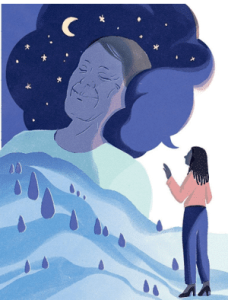
ILLUSTRATION: CORNELIA LI
Hire a Death Doula
Chelsea Peddle is a death doula: one of
of professionals in Canada who provide emotional and practical guidance for people near death and for their families. She earned her credentials at Dawson College, in Vancouver, but was originally set on this path at age 15 when her father died of an aggressive brain tumour. The experience had initially left Peddle with a crushing fear of illness and death. “I know what it’s like to feel lost and to not know what benefits and resources are available,” she says, “or even how to be with someone who’s dying.”
About half of Peddle’s clients today are in palliative care. Many are undergoing treatments, such as chemotherapy, for terminal illnesses. Every one of them is simply trying to wrap their head around the process of dying. She acts as a sounding board, directs them to resources, and helps them cope with the big emotions that come with knowing you’re going to die. “Sometimes there’s a sense of unfairness,” she says, “but a lot of the time there’s also this amazing level of acceptance.
Facing death is often harder for the families. One of Peddle’s clients, for example, was recently caring for her sick mom in the U.S., living away from her family in Victoria, B.C., and felt guilty and conflicted for wanting the whole thing to be over already. Peddle helped her process those tough feelings and release the shame she was holding. “She had no idea that it was an entirely normal way to feel,” Peddle says. “She was so relieved that it didn’t make her a horrible person and that she wasn’t alone.’”
Find out seven things you should never say at a funeral.
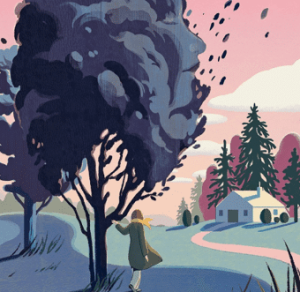
ILLUSTRATION: CORNELIA LI
Personalize Your Memorial
Gregory Williams, a tattoo artist, carver, musician and member of the Haida nation based in Skidegate, B.C., has always been fascinated by tattoos. “For me,” he says, “tattooing is understanding our past, living for the present and dreaming of the future.”
Williams’ daughter, Kaiya, was diagnosed with neuroblastoma, an aggressive cancer that targets nerve cells, at age five. Kaiya was smart, spunky and stubborn. She loved art and music and her home on Haida Gwaii in .C. She went into remission once but died in 2013, when she was 10. “When she passed, I thought my heart was going to stop,” Williams says.
Like many people, he saw an opportunity to use the art he loves to cope with his grief. Williams got several tattoos in honour of Kaiya, mixing his daughter’s ashes into the ink. One forearm tattoo depicts a raven, which represents his family’s clan and Kaiya’s heritage. He also has a tattoo of a spirit face on his throat—the placement represents her love of singing and music, and the subject represents her move from the physical to the spiritual realm.
“At times it’s difficult for me to do anything because I feel guilty about why I get to live,” Williams explains. Looking at the tattoos reminds him to live for his family. “They give me the strength that I need to not only move on, but to remember Kaiya for who she was as a person.”
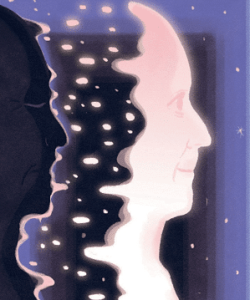
ILLUSTRATION: CORNELIA LI
Don’t Leave Loose Ends
The estate planner
Willful.co
Founder Kevin Oulds created Willful, his Toronto startup, in 2017 after his uncle died and left him to deal with a complicated estate. Using Oulds’ web service, will creation is as fast, cheap and secure as online banking or grocery shopping: you answer specific questions about your assets, family status and life situations, and then the app generates a legally sound estate plan. The whole process takes about 20 minutes—and all but eliminates the need for stratospherically priced estate lawyers, who may charge between $200 and $500 per hour. From $99.
The digital lockbox
Everplans.com
Gone are the days when family members had to ransack boxes and bank accounts to sort out their loved ones’ affairs. Instead, Everplans serves as a one-stop shop where meticulous planners can securely store all of their essential documents for their families to access after they die. Financial information, digital passwords, life insurance policies—they all go here and can be accessed by designated executors. US$75 per year.
The millennial manual
Joincake.com
The sleek and sunny end-of-life planning service designed by MIT brainiac Suelin Chen is largely targeted at 20- and 30-somethings seeking a head start on their end-of-life planning. Users fill out a profile, dating-site style, selecting how they want to deal with their medical care, legal documents and social media accounts. Cake is also stacked with breezy, approachable resources to educate users about matters like life insurance and power of attorney. Free.

ILLUSTRATION: CORNELIA LI
Pick the Right Time
In June 2016, the federal government passed Bill C-14, the landmark legislation that empowered Canadians to seek medical assistance in dying, or MAID. And in 2020, more than 7,500 people availed themselves of this right. But what does the legislation mean for patients and caregivers? Here’s a look at the ins and outs of physician-assisted death.
Step 1: The Criteria
Not every patient is eligible for MAID. First, patients have to be at least 18 and determined by a physician to be mentally competent. Next, they must have a grievous or irremediable medical condition. “That means they have to be in an advanced state of decline that cannot be reversed, they have to be experiencing unbearable physical or mental suffering and their natural death has to be reasonably foreseeable,” says Helen Long, the CEO of Dying With Dignity Canada.
Step 2: The Assessment
Anyone who wants a physician-assisted death is required to make a written request confirming they’re mentally competent and not subject to undue influence. Depending on the region, an official form may be required. The request also requires two witnesses who meet certain criteria—for example, they must not benefit financially from the MAID-requester’s death. After the form is completed, you can see a doctor or, in some provinces, a nurse practitioner. You will also need to undergo two assessments with whoever you choose to make sure you meet the criteria.
Step 3: The Location
MAID can take place wherever the patient is most comfortable. According to the federal government, 47.6 per cent of MAID patients died in their homes in 2020, while 28 per cent died in hospital, 17.2 per cent died in a palliative care facility and 5.7 per cent died in a residential care facility.
Step 4: The Procedure
Before going ahead with MAID, you’re typically required to wait at least 10 days to ensure it’s what you want. Then, if you still decide to complete the procedure, you need to find a doctor who’s willing to do it. The medications for MAID are administered intravenously and designed for a peaceful and painless death. Many physicians use a cocktail of midazolam, propofol and rocuronium: the first puts the patient to sleep, the second sends them into a deep coma and the third is a muscle blocker that stops the heart.
Step 5: The End
A scheduled death can allow people to say goodbye in the way they want. According to Helen Long, a MAID is often like a celebration of life—except the guest of honour gets to be there. “A friend of my dad had a classic car, and he and his son went for one last drive around the neighbourhood,” she says. “Once a person makes a decision, it’s often a very freeing experience for them. It gives them back their control.”


